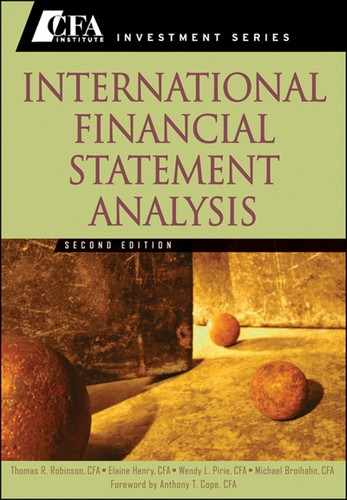FOREWORD
The stated objective of the International Accounting Standards Board is to produce accounting standards that are principle based, internally consistent, and internationally accepted. The resulting financial statements should provide a framework that gives capital market participants the tools to make rational and intelligent decisions. As an interpreter of the numbers that appear in the financial statements, the analyst is critical in this process.
International Financial Statement Analysis, second edition, looks at the subject from the analyst’s perspective. In today’s markets, analysts must make valuation estimates and accompanying decisions in an international context, which, in principle, is no different from a purely domestic one. In both cases, the financial reporting model is the primary source of the information required. Thus, this text focuses on the reporting model and uses learning outcomes and techniques designed to elicit careful analysis.
Moreover, although collecting and analyzing data is the core analytical function, communication is also critical. Even the best and most rigorous analysis must be supplemented by an understanding of how investment decisions are made, or else it will fail its purpose. It must be communicated to the intended recipient in a way that explains the logic behind the valuation estimate or recommendation and in a way that promotes understanding and action. This text wonderfully helps bridge the gap between analytical methods and proper communication skills.
Most importantly, however, the text emphasizes the need to exercise judgment as part of the analytical process—a particularly critical skill in the context of International Financial Reporting Standards (IFRS). A vital element of IFRS is that the standards are principle based and not unduly prescriptive (as some perceive U.S. generally accepted accounting principles to be). The objective is to allow a degree of flexibility that permits company management to present corporate results in the most meaningful way while preserving the spirit intended—substance over form. This flexibility, however, presents the analyst with an additional challenge in interpreting the published figures and comparing them with those of other entities.
CFA Institute and its members have long supported the development of a global set of accounting standards; the benefits, in terms of improved comparability for investors and lowered cost of capital for corporations, are evident. IFRS are now accepted or required, in whole or in part, in some 100 jurisdictions around the world. (In the United States, only a few foreign registrants with the U.S. SEC are permitted to use IFRS.) Achieving comparability between companies reporting in Tokyo, Toronto, or Turin would seem to meet the cherished goal of a global financial reporting system. But a word of caution is warranted. Few countries want to give up sovereignty to an independent authority based in London, no matter how high the quality of the output may be. Standard setting is ultimately a political process, and a myriad of powerful constituencies have objectives that may differ from the providing of decision-useful information to investors. And in order for standards to become law across many jurisdictions, some sort of endorsement mechanism must be established. In some cases, endorsements can exclude provisions in standards or offer exceptions or options not present in the original. The result can be deviations from the published standards, and the analyst must be vigilant to discern these differences and their significance.
A solid grounding in the principles contained in this text will help analysts combine collecting and analyzing data with appropriate judgment about what differences are important and how to communicate them. As such, I believe the text will be a valuable resource for analysts striving to compare increasingly global and interdependent companies in a world where financial reporting may continue to vary between countries and industries.
Anthony T. Cope, CFA
Former FASB and IASB Board Member
